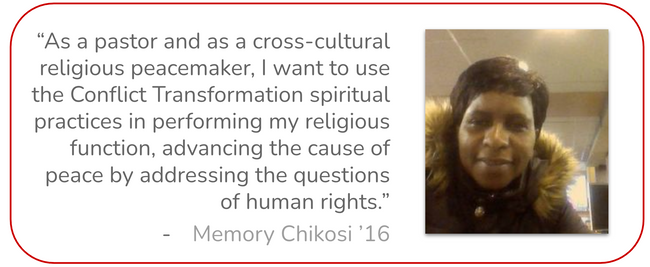About The Program
The Tom Porter Religion and Conflict Transformation (RCT) Program is a seminary-based program in theologically-informed conflict transformation. It trains religious leaders in the theologies, theories, and practices of conflict transformation.
The program is offered to students enrolled in degree programs, as well as to non-degree students, such as ministers and other professionals in the field seeking to advance their education and receive training and certification in the area of religion and conflict transformation.
Students who complete the RCT Certificate will be able to…
- Communicate a clear definition and framework of conflict transformation.
- Describe theological or theoretical foundations for the work of conflict transformation from within their own religious or ethical tradition.
- Lead or practice embodied conflict transformation practices in their communities.
- Reflect critically on their own experience and social contexts in light of conflict transformation theories, theologies, ethics, and practices.

Distinctive Elements
Multicultural and Interfaith: In all its programs, the RCT Program attempts to embody in its practice the possibility of a pluralistic peace via practices of learning, ritual, justice, and community. Rooted in Protestant Christian traditions, the Program has graduated practitioners of all global religious traditions as well as those who do not practice a religious tradition. Graduates have come from Africa, Asia, Central and South America, across the United States, and nearly every neighborhood in Boston. There are few programs in the world with the combination of racial, national, and religious diversity that exists here.
Urban Context: The RCT Program is the only such program in North America located in the heart of a major city with a global footprint. This enables opportunities to learn and practice both in and beyond the classroom in ways that can uniquely prepare graduates to lead communities through the conflicts of our globalizing world.
Emphases in Restorative Justice and Community Organizing: The RCT Program at BU has particular strengths in restorative justice and in community organizing. There is no other place that weaves these conflict transformation traditions together in the ways they are in the RCT Program. In addition, there are opportunities to practice these skills at BU and in the greater Boston area. In particular, the RCT Program hosts its own contextual education/internship experience focused on learning how to be a peacemaking circle keeper.
Specialization in Ecology and Conflict: Environmental conflicts over land, water, climate change, and more will increasingly define life in the 21st century. Through a partnership with the Faith and Ecological Justice Program (FEJ), students can earn credits toward the RCT certificate by participating in FEJ, growing their knowledge and skills at this specific intersection. (In recent years this partnership has produced a travel seminar titled “Liberation Theology and Socio-Ecological Conflict in Brazil (2025)” and the forthcoming inaugural Machozi Symposium (2026).)
Partnership with Boston Theological Interreligious Consortium (BTI): The RCT Certificate is earned through the BTI. This partnership enables students to enroll in elective courses at any of the BTI schools including Boston College School of Theology and Ministry, Hartford International University for Religion and Peace, Harvard Divinity School, Gordon Conwell Theological Seminary, and more!
Program History
Click here to read more about this program’s history.